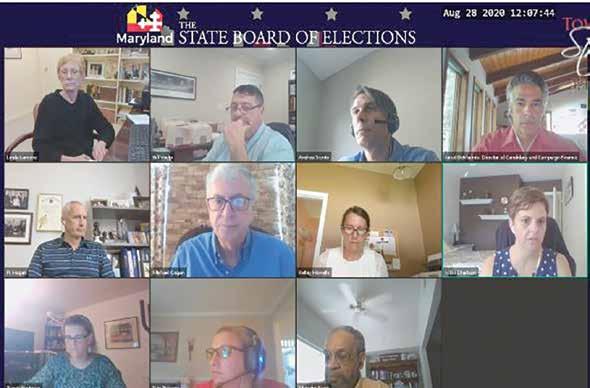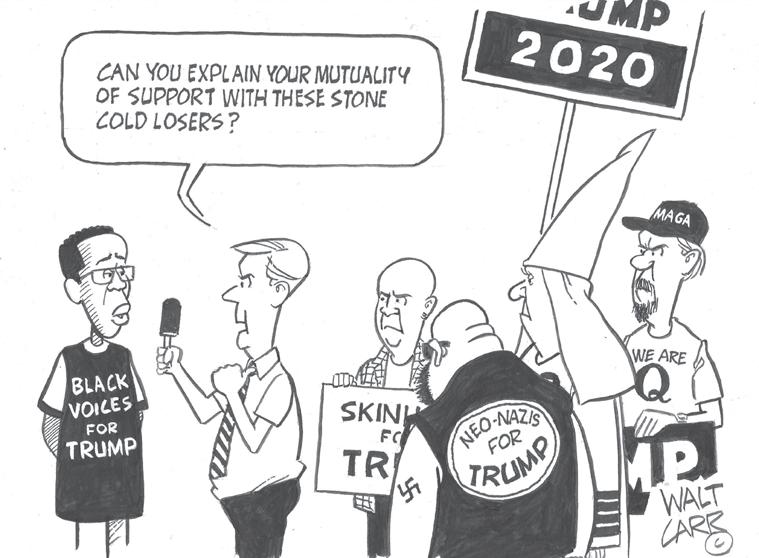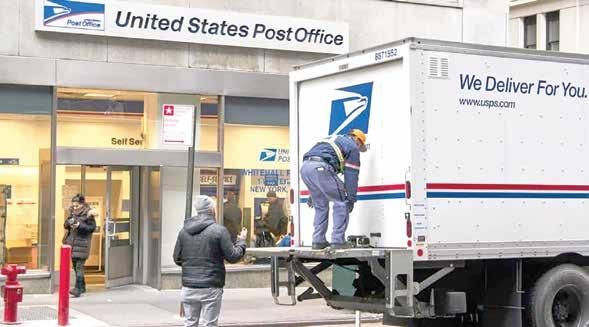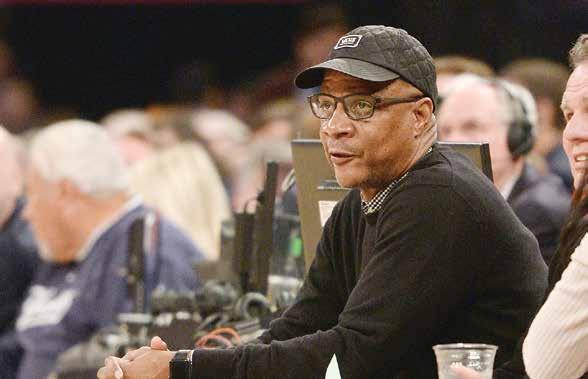
11 minute read
PG County
PRINCE GEORGE'S COUNTY
First Baptist Church of Highland Park’s Caravan Takes Issues Directly to Community
By Hamil R. Harris others who have been shot by the WI Contributing Writer police. Their car was part of a caravan the church organized to make 5 Marion Jamison (left) holds signs she created for a caravan with the First Baptist Church of Highland Park to bring attention to the
Marion Jamison will never forpeople aware of the issues, register lives lost to police and encourage people to participate in the census. (Hamil Harris/The Washington Informer) get attending the 1963 March on to vote and encourage people to Washington because, “I enjoyed register for the census. neck until they couldn’t breathe. cans living a nightmare. hold his hands in the air with no doing that because there was such “As a young person when I You have authority to protect, “I am glad that you have so sense of concern. a meaning inside of me that said watch the news and I see my peers serve and help us but it doesn’t many professional athletes who Instead of simply protesting, the this is what you have to do.” dying it really hurts because we are mean to kill us.” are saying that we are not going to members of First Baptist Church
But on Friday, 57 years latsupposed to be a country with uniRev. Henry P. Davis, pastor of entertain while on the flip side we of Highland Park organized a carer, Jamison and her 15-year-old ty and we are supposed to be free the First Baptist Church of Highare looking at all of the pain in the pool that went throughout the granddaughter decorated the rear but you can’t be free if you don’t land Park, said, “World events street,” Davis said. “How is it that neighborhood to register people to window of their car with “Black have the same rights as everyone,” have brought us to this point from we can see a man gunned down, vote. Davis said when church orLives Matter,” and the names of Tabitha Jamison. “I can’t breathe is the anniversary of Dr. King’s s shot seven times in the back and ganizers did their homework, they Freddie Gray, George Floyd, Breso powerful because what possesses dream and you realize that after 57 you can have a 17 year-old white learned the depth of the election onna Taylor and the names of you to push so hard on someone’s years you still have African Ameriboy who can walk with a gun and problem. “We are going to take our car Ideas Presented on Criminal Justice Reform caravan to a specific community because we learned that only 30 percent of the people voted in the last election. Those kinds of By William J. Ford One of the main items dealt with would want any of our family memthings have to change,” Davis said. WI Staff Writer a report released in November by the bers in a place like that,” he said. “We have to bridge the gap from @jabariwill Justice Policy Institute of Northwest Franklin said he’s contemplating dreams to reality.” that noted Maryland recorded the proposed legislation to prohibit disRev. Rachel Boyd, social justice Prince George’s County State’s Athighest number of Blacks incarceratcrimination against returning citiminister at First Baptist Church torney Aisha Braveboy said mentored in the nation at more than 70 perzens who apply for jobs with felony of Highland Park, said, “Rev. ship and re-entry programs should be cent of the state’s prison population. convictions at least five years old and Sharpton and the National Action prepared for those incarcerated once Young Black men ages 18 to 24 are misdemeanor offenses three years or Network [were] downtown cela sentence gets imposed. incarcerated with the longest prison older. Applicants would not have no ebrating the 57th anniversary of “When people go away, they are terms, according to the report. other prior offenses. the March on Washington. Our still part of our community,” she Olinda Moyd, a defense attorney “That is a big impediment to a lot effort is to make sure that people said. “Even though that person may and member of Maryland Alliance of our returning citizens staying on a are informed of the issues and the not physically be in Prince George’s executive board, said Prince George’s pathway of straight and narrow,” he options and to excite some sense County, we know their connections receives about 400 returning citizens said. “We encounter many returnof urgency regarding these matters are likely to be in our county.” a year. ing citizens who are very qualified and to allow everyone to play some Braveboy joined three other That’s why at-large council memto do work in the county but cannot role in making a change.” lawmakers who represent Prince bers Mel Franklin and Calvin Hawget hired because once their backTodd Coogan, regional cenGeorge’s during a virtual discussion kins are working on legislation to creground check is done…then you are sus manager for Maryland, said Monday, Aug. 31. ate financial incentives for businesses knocked out of contention.” that the U.S. Census Bureau is The discussion entitled “Marywho hire returning citizens. Del. Erek Barron (D-District 25) in the phase of the census, which land’s Disproportionate Incarceration In addition to getting a bill passed of Mitchellville said he will continue takes place every decade, of going of African Americans” led by Maryto create an advisory re-entry board, to try to change state laws that hurt house to house. “We have to try land Alliance for Justice Reform, Peohe said the county must build a statelow-income residents. reach people the best way that we 5 Prince George’s County State’s Attorple for Change Coalition and PFC of-the-art county jail to replace curOne bill he sponsored that passed can through the month of Sepney Aisha Bravevboy (WI File Photo/ Robert R. Roberts) Black Chamber had more than 110 people logged on. rent one. “It’s old. It’s outdated. None of us JUSTICE Page 43 tember.” WI 12 - SEPTEMBER 3 - 9, 2020
VOTE from Page 1
“We are not confidence that any of our individuals behind the walls have access to the ballot and we don’t have proof that they did,” said Nicole Hanson-Mundell, executive director of Out For Justice, an advocacy organization based in Baltimore that helps former and current incarcerated individuals.
“We are crafting the [voter information] packets into local detention centers across the state. We can’t go through this boxed-type process every election cycle.”
Nikki Charlson, deputy state administrator for state Board of Elections, acknowledged the advocates’ groundbreaking efforts in implementing this process as it’s usually done on a local level.
Charlson said once the state receives a list, it will count the number of people from each detention center, then mail packets of information with a letter explaining voter eligibility, how to vote, a voter registration form to request a mail-in ballot and a self-addressed stamped envelope.
Once voter registration forms are returned, the votes will be counted, she said.
The state Board of Elections has a system that can flag if a person has a current felony conviction which would make that person ineligible to vote. Individuals convicted for buying or selling votes cannot register.
“I think the fact that we are doing this mailing shows our commitment to making sure that the eligible voters behind the wall are being able to participate in the process,” Charlson said. “State and local election officials are working diligently to prepare a safe election for voters.”
The state Department of Public Safety and Correctional Services department of corrections provided not only a list of eligible voters to the Board of Elections from the Baltimore jails but also the names of 2,743 currently housed at state prisons and other facilities.
“However, the Department is not in any way able to track or determine who actually votes,” said Mark Vernarelli, corrections spokesman, in an email Tuesday.
In a separate emailed statement Thursday, Aug. 27, the agency’s policy requires each correctional facility to display signs on whether an inmate needs a legal representative to complete a voter application or mail-in ballot, deadlines to return forms and other voter information.
“The department had previous procedures in place to ensure the incarcerated population is able to exercise the right to vote,” according to the statement. “However, Secretary [Robert L.] Green recognized the need to codify and refine the policy to ensure consistency throughout the department’s correctional facilities.”
Maryland has about four million registered voters with census data showing the state’s Black population stands at 31 percent. However, the Justice Policy Institute of Northwest published a report in November that noted the state in 2018 recorded the highest number of Blacks incarcerated in the nation at more than 70 percent.
To ensure those incarcerated aren’t forgotten, state Sen. Cory McCray (D-Baltimore City) penned an Aug. 12 letter to Election Administrator Linda Lamone with a few directives including: request a list of eligible voters from the two city jails managed by the state department of correctional services; send absentee ballots directly to each eligible voter; and provide inmates voter registration deadlines and when to cast a ballot.
McCray said in an interview Thursday some 700 are eligible to vote at the two city jails and voter information will be sent to them. He admitted responsibility to constantly educate both the public and state officials about the importance of ensuring that the incarcerated be allowed the right to vote.
The assistance of diverse administrators further helps, McCray said, who sponsored legislation in 2015 as a delegate for returning citizens on parole or probation to vote which affected about 40,000 people. Gov. Larry Hogan vetoed the bill but the legislature overrode his veto in 2016, making it become law.
“A lot of the people that are in decision-making positions have not lived the life that we’ve lived. They have never spent one day…as a Black man or Black woman,” McCray said. “I am not defending them but they clearly want to do the right thing and may not know how to do the right thing. We must educate the masses to make sure they’re woke and make sure they are concise about the decisions that are in front of them.”
He received assistance from Monica Roebuck, a member of the Prince George’s County Board of Elections. She also serves on a voter protection committee with the Maryland Democratic Party. McCray serves as first vice chair of the party.
5 A Zoom meeting held by the Maryland State Board of Elections on August 28, 2020. (Screen grab)

When the county assesses how many incarcerated individuals may be eligible to vote, Roebuck said a list must be sent and approved by the state.
“For too long, this population has been overlooked. No more,” she said. “We have so much work to do.”
The Prince George’s state’s attorney’s office continues to work on “Operation Protect the Vote for All” to assess and determine eligible voters with the county Department of Corrections and state Board of Elections.
Maryland has about four million registered voters with census data showing the state’s Black population stands at 31 percent. However, the Justice Policy Institute of Northwest published a report in November that noted the state in 2018 recorded the highest number of Blacks incarcerated in the nation at more than 70 percent.
The Sentencing Project, a national criminal justice advocacy organization in Northwest, published a report in May to highlight about 482,000 out of 745,000, or 64 percent, of individuals incarcerated in 2017 were held on pretrial status.
The group notes the majority of the 263,000 received a misdemeanor conviction.
“Despite the fact that most persons detained in jail are eligible to vote, very few actually do,” according to the Sentencing Project report. “Jail administrators often lack knowledge about voting law and bureaucratic obstacles to establishing a voting process within institutions contribute significantly to limited voter participation.”
Here are a few recommendations the group cites for local and state lawmakers: • Establish jail polling locations; • Require county jail voter registration plans; • Authorize special status for incarcerated voters; and • Designate a jail voting coordinator.
In Maryland, one bill failed to become approved due to the shortened session in Annapolis caused by COVID-19.
Del. Nick Mosby (D-Baltimore City) and Sen. Chris West (R-Baltimore County) presented legislation in their respective chambers that would’ve required each correctional facility to disseminate voter information to each eligible person incarcerated. In addition, legislation called for mandating the state Board of Elections to disseminate certain voting materials to each and for the state Department of Corrections to provide a voter registration application and other information for those released.
Meanwhile, some lawmakers and criminal justice and voting advocates suggest ending the trend toward increased mass incarceration because it can save states money.
According to fiscal year 2018 data, the average cost to house each person incarcerated in the more than two dozen state facilities cost nearly $46,000. The average length of stay lasted slightly more than two years.
Although the COVID-19 pandemic hampered in-person events, that hasn’t stop Hanson-Mundell with Out For Justice to use word of mouth, post fliers on social media and other means of communication to help returning citizens and those incarcerated. Her group either coordinated or participated this year in events on voter registration, the 2020 Census and recruit election judges and will participate in a statewide voter registration effort for incarcerated individuals Sept. 22, the same day as National Voter Registration Day.
“We care about making sure that all eligible people have the right to vote,” she said. “They are still citizens and deserve to be treated as such.” WI






